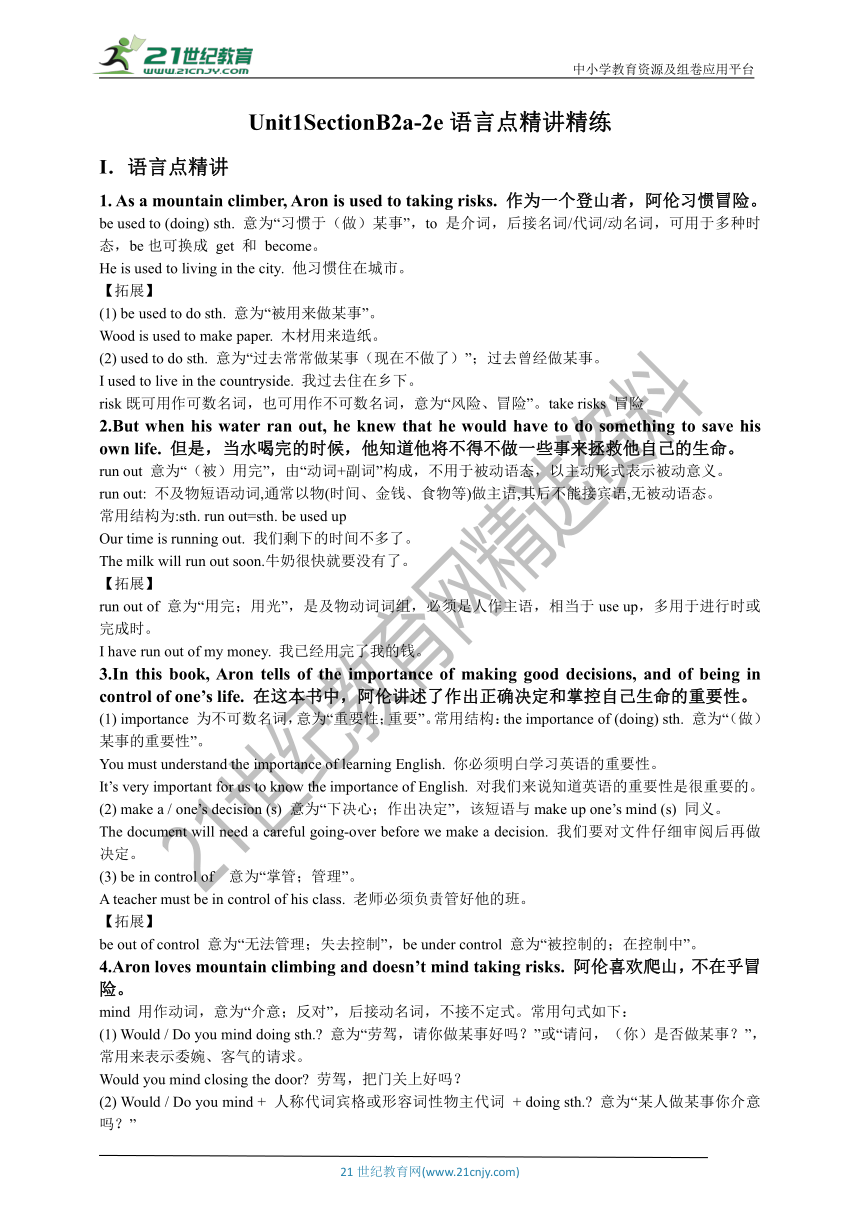
中小学教育资源及组卷应用平台 Unit1SectionB2a-2e语言点精讲精练 I.语言点精讲 1. As a mountain climber, Aron is used to taking risks. 作为一个登山者,阿伦习惯冒险。 be used to (doing) sth. 意为“习惯于(做)某事”,to 是介词,后接名词/代词/动名词,可用于多种时态,be也可换成 get 和 become。 He is used to living in the city. 他习惯住在城市。 【拓展】 (1) be used to do sth. 意为“被用来做某事”。 Wood is used to make paper. 木材用来造纸。 (2) used to do sth. 意为“过去常常做某事(现在不做了)”;过去曾经做某事。 I used to live in the countryside. 我过去住在乡下。 risk既可用作可数名词,也可用作不可数名词,意为“风险、冒险”。take risks 冒险 2.But when his water ran out, he knew that he would have to do something to save his own life. 但是,当水喝完的时候,他知道他将不得不做一些事来拯救他自己的生命。 run out 意为“(被)用完”,由“动词+副词”构成,不用于被动语态,以主动形式表示被动意义。 run out: 不及物短语动词,通常以物(时间、金钱、食物等)做主语,其后不能接宾语,无被动语态。 常用结构为:sth. run out=sth. be used up Our time is running out. 我们剩下的时间不多了。 The milk will run out soon.牛奶很快就要没有了。 【拓展】 run out of 意为“用完;用光”,是及物动词词组,必须是人作主语,相当于use up,多用于进行时或完成时。 I have run out of my money. 我已经用完了我的钱。 3.In this book, Aron tells of the importance of making good decisions, and of being in control of one’s life. 在这本书中,阿伦讲述了作出正确决定和掌控自己生命的重要性。 (1) importance 为不可数名词,意为“重要性;重要”。常用结构:the importance of (doing) sth. 意为“(做)某事的重要性”。 You must understand the importance of learning English. 你必须明白学习英语的重要性。 It’s very important for us to know the importance of English. 对我们来说知道英语的重要性是很重要的。 (2) make a / one’s decision (s) 意为“下决心;作出决定”,该短语与make up one’s mind (s) 同义。 The document will need a careful going-over before we make a decision. 我们要对文件仔细审阅后再做决定。 (3) be in control of 意为“掌管;管理”。 A teacher must be in control of his class. 老师必须负责管好他的班。 【拓展】 be out of control 意为“无法管理;失去控制”,be under control 意为“被控制的;在控制中”。 4.Aron loves mountain climbing and doesn’t mind taking risks. 阿伦喜欢爬山,不在乎冒险。 mind 用作动词,意为“介意;反对”,后接动名词,不接不定式。常用句式如下: (1) Would / Do you mind doing sth. 意为“劳驾,请你做某事好吗?”或“请问,(你)是否做某事?”,常用来表示委婉、客气的请求。 Would you mind closing the door 劳驾,把门关上好吗? (2) Would / Do you mind + 人称代词宾格或形容词性物主代词 + doing sth. 意为“某人做某事你介意吗?” Do you mind my closing the window 我把窗户关上,你介意吗? (3) Would/Do you mind + if 从句 意为“你是否介意……?”。 Do you mind if I close the window 我把窗户关上,你介意吗? 【拓展】 (1) change one’s mind 意为“改变主意”。 (2) make up one’s mind 意为“下定决心”。 (3) keep in one’s mind 意为“牢记……”。 (4) in one’s mind 意为“在某人的脑海中”。 5. Aron did not give up after the ... ...
~~ 您好,已阅读到文档的结尾了 ~~